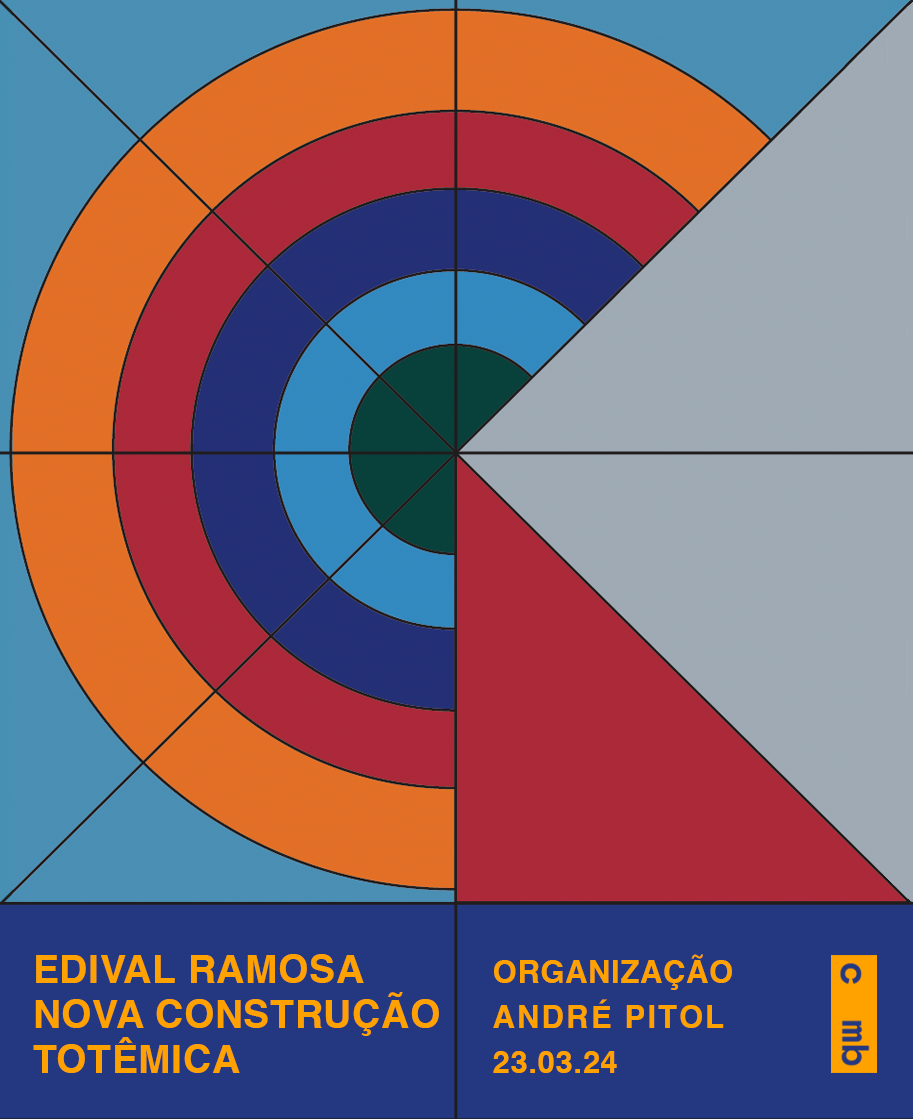
“Son of an Indian father and a Black mother,” Edival Ramosa (1940–2015) is an unavoidable name in Brazilian geometric abstract production, alongside artists such as Almir Mavignier, Rubem Valentim and Emanoel Araújo. Present in the main Brazilian exhibitions dedicated to contemporary Afro-Brazilian art from the 1970s and 1980s, in addition to numerous international exhibitions, Ramosa now has a solo show that takes a new look at his work after two decades of hiatus: New Totemic Construction, curated by researcher and curator André Pitol, opens on March 23rd at the moraes-barbosa collection and reveals the potential that Ramosa sees in abstraction to create a racialized artistic space in contemporary art.
Constantly elaborated on the diasporic journey he took in life, Ramosa's spheres, columns, rainbows and comets are facets of a continuous study around geometries. This imaginary of “object-forms,” valuing colorful gradations and geometric variations, materializes in the sculptures, silkscreens, projects and spheres that make up New Totemic Construction.
The exhibition focuses on works and projects produced in Italy from the 1960s and 1970s, mainly in acrylic, engraved steel and lacquered wood. The artist settled in Milan between 1964 and 1974, in the midst of the artistic neo-avant-garde, notably constructive, kinetic and op, and worked as an assistant in the studios of Arnaldo Pomodoro and Lucio Fontana. “It is notable how Ramosa’s geometric thinking reverberates in totemic and circular works, as well as highlighting the abstract-racial complexity of his poetics and the proximity he had with other artists, concerns and opportunities focused on the experimental,” observes curator André Pitol, who carried out rigorous research to recover and understand the trajectory and artistic production of Edival Ramosa.
New Totemic Construction comes from the title of a totemic project that the Afro-Indigenous artist designed the year he landed in Italy. The exhibition also features more recent works, as well as Ramosa's other creative interests. Of note is the artist's collaboration with designer GianCarlo Montebello in 1967 in the creation of artists' jewelry. Two of the five models created by Ramosa are in the exhibition, along with images from a shoot by photographer Ugo Mulas, who captured the collection.
Added to the set are drawings and projects for sculptures and furniture, such as a bookshelf made of modular components. Of particular note is the presentation for the first time in Brazil of the militant experimental film Political Process (1971), directed by the poet, professor and political activist Francesco Leonetti (1924-2017). Wearing dark jeans, a leather jacket, and a black-power beard and haircut, Ramosa appears alongside other visual artists, actresses and activists in scenes of wandering around the center of Milan. These images are mixed with audiovisual records of the political events of the moment – such as the labor movement, its assemblies, strikes and struggles for better working conditions in Italy in the 1960s and 70s.
Long-term reasearch
Curator André Pitol has been focusing on Edival Ramosa's production for three years, having presented the initial results of his research in the important exhibition The Parable of Progress, presented in 2022 and 2023 at Sesc Pompeia, of which Pitol was assistant curator alongside Yudi Rafael under the general curatorship of Lisette Lagnado. On that occasion, Ramosa and his work were portrayed in one of the “documentary groups” that made up the exhibition.
Also in 2023, Pitol contributed an updated mini-biography about the artist in the publication Rio XXI: Constructive Aspects (Editora FGV, 2023) organized by Paulo Herkenhoff.
New Totemic Construction consolidates another stage of the curator's work, and is the result of his participation in the third cycle of the moraes-barbosa collection’s (SP) research program. The program draws on the material available in the collection's archive to propose the formulation of narrative and conceptual articulations marked by theoretical, political, formal and poetic concerns.

About the artist
Edival Ramosa (São Gonçalo, RJ, 1940 – Niterói, RJ, 2015) was a contemporary artist and “son of an Indian father and a Black mother,” as he identified himself. Between 1961 and ‘62 he was a volunteer military soldier in the UN Peace Expeditionary Corps in the Suez Crisis, a conflict between Egypt and Israel starting in 1956, which allowed him to visit countries around the Mediterranean Sea.
He began his artistic career in Milan, Italy, where he lived between 1964 and 1974 and was an assistant in the studios of Arnaldo Pomodoro and Lucio Fontana. His Afro-Atlantic circulation also covers other Italian cities, as well as countries such as Egypt, Morocco, Yugoslavia, the United States, Switzerland, Belgium and England, and Brazilian cities such as Cuiaba, Cabo Frio, Ribeirão Preto, Brasília, São Paulo and Ubatuba, among many other places in this diasporic trajectory.
He held individual and collective exhibitions, such as Perpetuum Mobile [Perpetual Motion] (Rome, 1965), Sept Artistes Brésiliens [Seven Brazilian Artists] (Geneva, 1968), Ljubljana Engraving Biennial (Slovenia/Yugoslavia, 1971), Geometrics Drawings and Prints (New York, 1971), Edival Ramosa : Homage to the Indian Gods, Ritual Imitations, Invented Reproductions of Indigenous Life (Ferrara, 1974), I Latin American Biennial of São Paulo (1978), The Afro-Brazilian Hand (São Paulo, 1988), Rhythms, Colors and Forms ( São Paulo, 2003), among others.
Visits March 3rd to June 1st of 2024
Wednesdays to Fridays: from 1pm to 7pm
Saturday: from 11am to 7pm
Free admission
location
Travessa Dona Paula, 120
São Paulo - SP